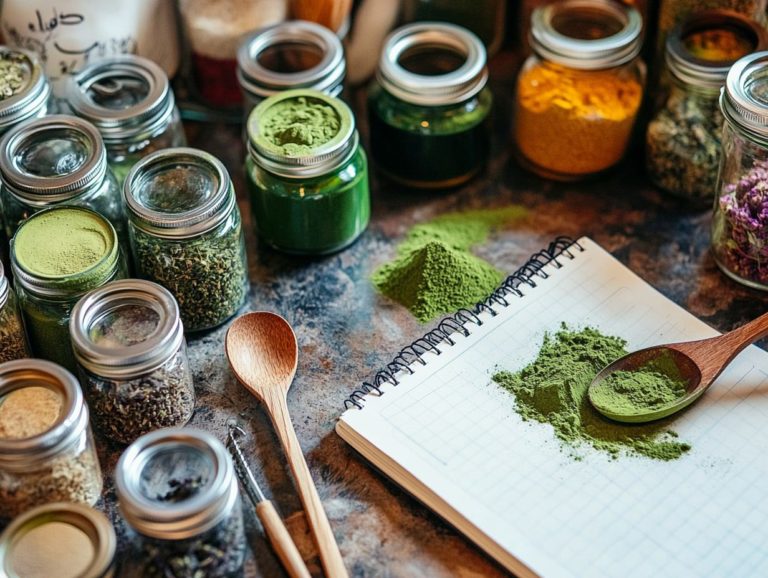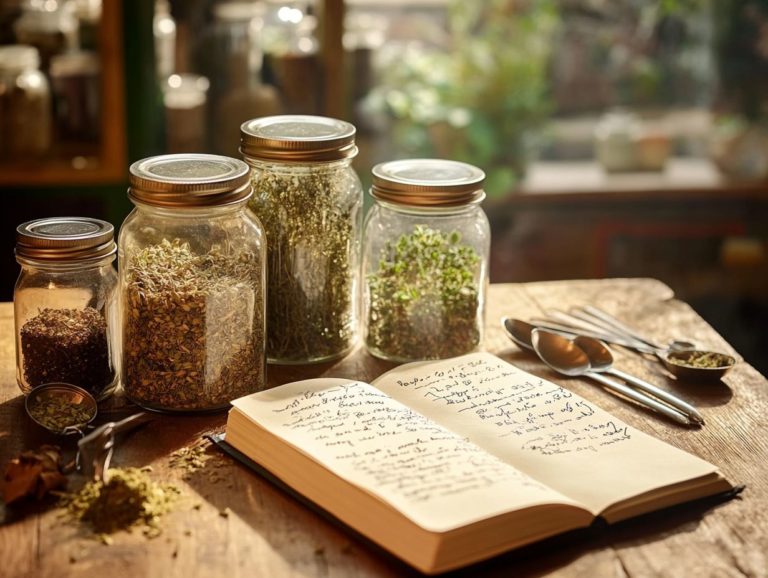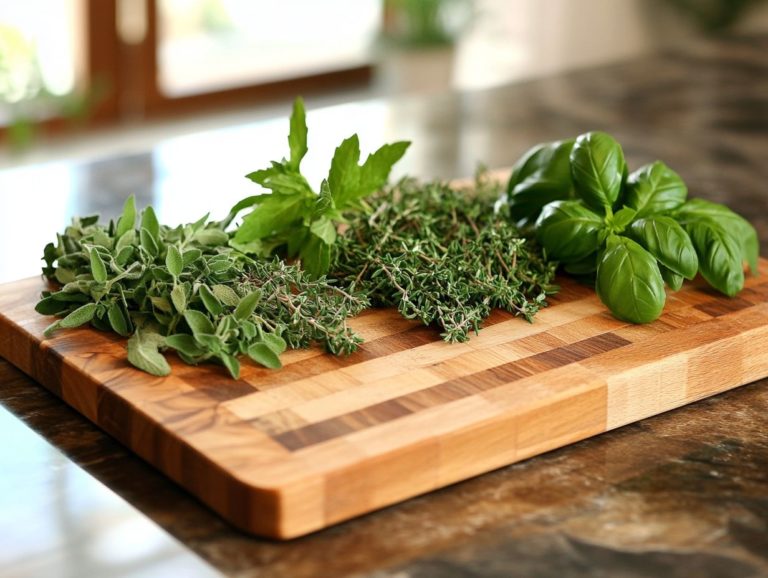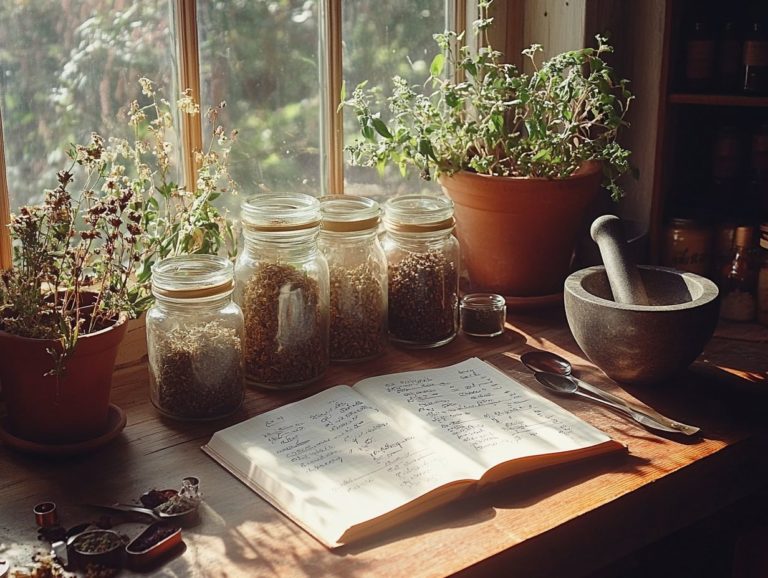Understanding Herbal Concentrates: Dosage Insights
Herbal concentrates have surged in popularity, celebrated for their potential health benefits and unmatched convenience. However, understanding these herbal nutraceuticals is crucial for ensuring safe and effective use.
This article delves into herbal concentrates, exploring the various types of medicinal plants available and the myriad advantages they offer. It also examines how individual characteristics can influence dosage equivalents, providing tailored guidance to determine the right amount for your needs.
We will also highlight potential toxicity and important safety precautions to consider. Join us on an exciting journey to discover the amazing benefits of herbal medicines!
Contents
- Key Takeaways:
- What are Herbal Concentrates?
- Benefits of Herbal Concentrates
- Factors Affecting Dosage
- How to Determine the Right Dosage
- Potential Side Effects and Safety Precautions
- Frequently Asked Questions
- Curious about herbal concentrates? Discover their benefits and popularity!
- How should herbal concentrates be dosed to ensure effectiveness and safety?
- Are there any risks associated with consuming herbal concentrates or herbal medicines?
- Can herbal concentrates and other medicinal herbs be used for children?
- What is the best way to consume herbal concentrates and herbal tinctures?
- How long does it take for herbal concentrates and plant extracts to take effect?
Key Takeaways:
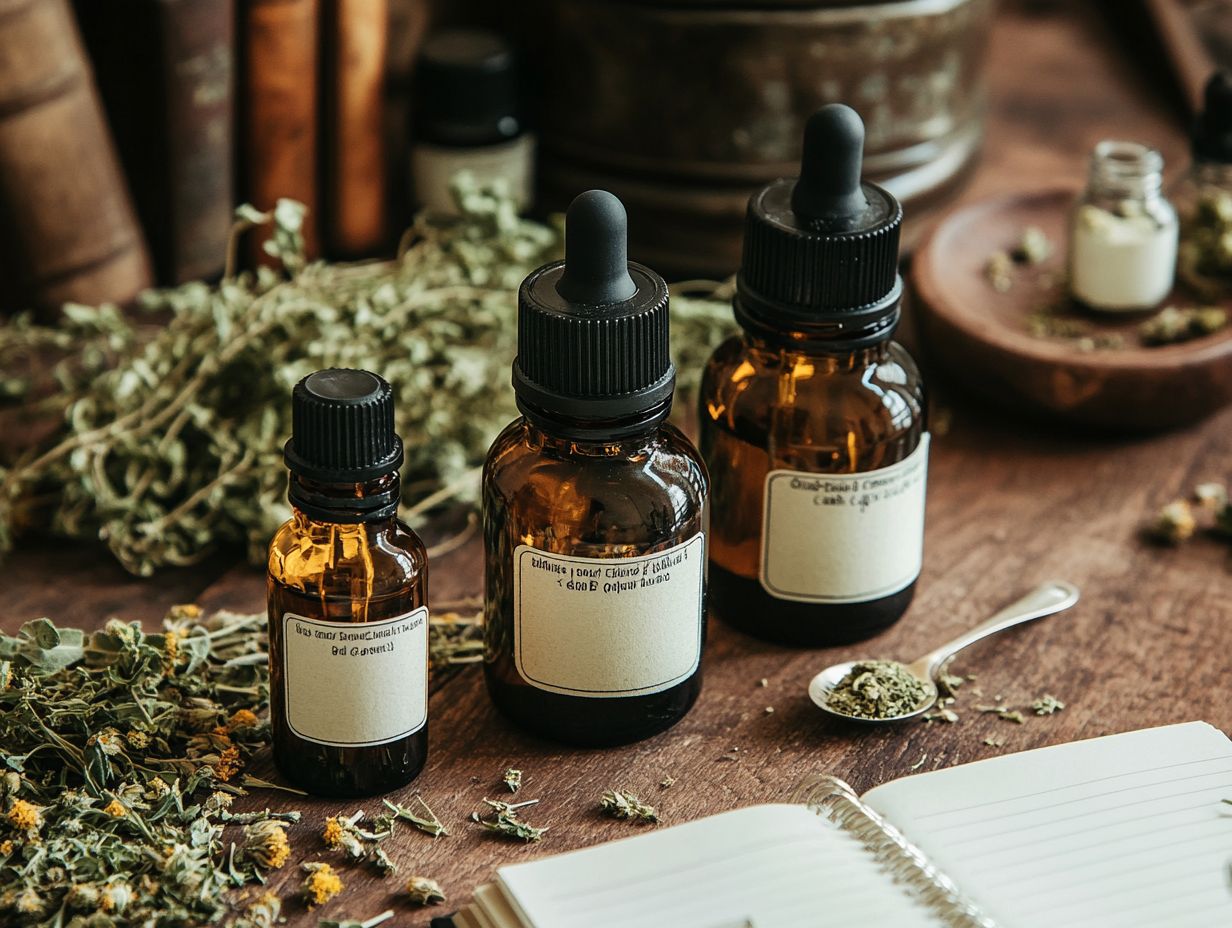
- Herbal concentrates are highly potent extracts of medicinal plants, available in various forms such as herbal tinctures, oils, and capsules.
- These concentrates have potential therapeutic benefits, including boosting the immune system and reducing inflammation, but the right dosage is crucial to reap these benefits.
- Individual characteristics, such as age and weight, along with dosage considerations, such as potency and method of consumption, should be taken into account when determining the appropriate dosage of herbal formulations.
What are Herbal Concentrates?
Herbal concentrates are concentrated forms of active ingredients from medicinal plants like Aloe Vera, Turmeric, and Garlic. These concentrates are packed with active substances that have a positive effect on health, making them essential in the realm of herbal medicine.
We can gather these powerful ingredients using techniques like supercritical fluid extraction, which uses high pressure to obtain more of the plant s goodness.
The spectrum of herbal concentrates encompasses tinctures, selective extracts, and traditional herbal extracts made from plants, each with its unique medicinal properties and applications in promoting health and wellness.
Definition and Types
Herbal concentrates are potent forms of herbal nutraceuticals that capture the active compounds extracted from medicinal plants, contributing to their phytochemical characterization.
These concentrated forms come in various types, each offering unique benefits based on the extraction method used, such as herbal tinctures and traditional extracts. For example, herbal tinctures harness alcohol or glycerin to draw out the delicate constituents of plants, resulting in a product that is quick to absorb and highly potent. Traditional extracts utilize water or hydroalcoholic solutions, effectively capturing a wider range of plant extracts while preserving their therapeutic integrity. To ensure safe usage, it’s important to understand recommended dosages for herbal supplements.
Selective extracts take it a step further by isolating specific compounds through advanced techniques like supercritical CO2 extraction. This process enhances purity and potency while minimizing any unwanted elements, making them favorable options in herbal medicines. Each of these methods influences the flavor and aroma of the final product and can significantly impact the therapeutic effects, as discussed in herbal dosage for immune support, enhancing the medicinal properties of herbal formulations for specific health applications.
Benefits of Herbal Concentrates
Herbal concentrates offer many health benefits. This is due to their rich active ingredients extracted from plants like Echinacea, Ginger, Chamomile, and Valerian, each renowned for their potent healing properties.
Potential Health Benefits
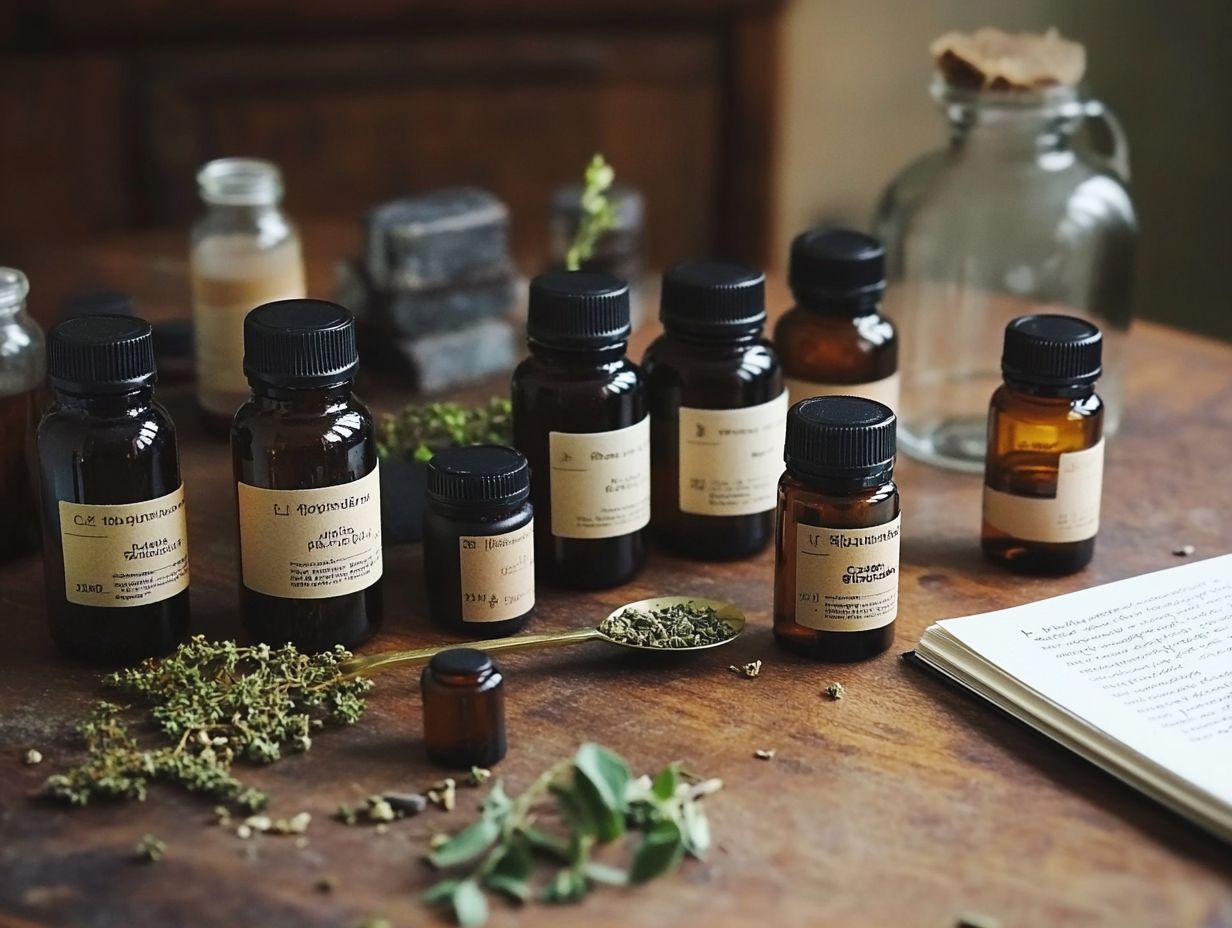
The potential health benefits of herbal concentrates arise from their elevated levels of bioactive compounds found in herbal medicines, which makes extracting bioactive compounds super important! These compounds, often enhanced through various herbal processing techniques, play an essential role in promoting your overall wellness and improving metabolic function.
Certain herbal concentrates may exhibit anti-inflammatory properties, which can be particularly advantageous in alleviating symptoms associated with chronic conditions like arthritis or digestive issues. Other formulations might specifically target digestive issues, utilizing natural extracts such as Milk Thistle (known for supporting liver health) and Silybum marianum to help balance gut health and improve metabolic function.
The synergy of these concentrated compounds can boost your immunity, acting as a natural defense against common ailments and enhancing your overall health with therapeutic benefits.
By utilizing the strength of nature through precise herbal extraction methods, you can delve into a variety of therapeutic options tailored to your individual health needs.
Factors Affecting Dosage
Grasping the factors that impact dosage is essential for maximizing the therapeutic benefits of herbal concentrates and ensuring safety through proper dosing. Your individual characteristics such as age, weight, and health conditions play a significant role in determining the appropriate dosage needed for optimal results.
Individual Characteristics and Dosage Considerations
Individual characteristics, such as your genetics, age, and health conditions, are crucial in determining the right dosage of herbal concentrates for you and ensuring effective use of herbal nutraceuticals.
For example, if you re an older adult, you might find that your body breaks down herbal ingredients more slowly than that of a younger person, which could increase your risk of experiencing negative side effects, particularly related to potential toxicity. If you have a pre-existing health condition, like liver dysfunction, the typical herbal dosages that are generally considered safe for most could lead to heightened toxicity and adverse interactions with certain herbal formulations.
Take St. John’s Wort and Ginkgo as a case in point; while they can be great mood enhancers, individuals with genetic differences that change how your body processes drugs may need to opt for lower dosages to prevent interference with other medications. This highlights the significance of a personalized approach to using herbal nutraceuticals, which can help you find the right balance between effectiveness and safety tailored to your unique circumstances, especially when considering the potency of the active chemicals involved. For older adults, it’s particularly important to follow herbal remedies dosage tips to ensure safety and efficacy.
How to Determine the Right Dosage
Determining the right dosage of herbal concentrates is crucial for you to achieve the therapeutic effects you desire while simultaneously minimizing the risks of potential toxicity and ensuring safe usage. You need to carefully consider several factors, including the extraction techniques used, to ensure that your approach is both effective and safe.
For personalized dosage recommendations, consider consulting a healthcare professional who can provide insights on how environment affects herbal dosage safety.
Factors to Consider and Recommended Dosages
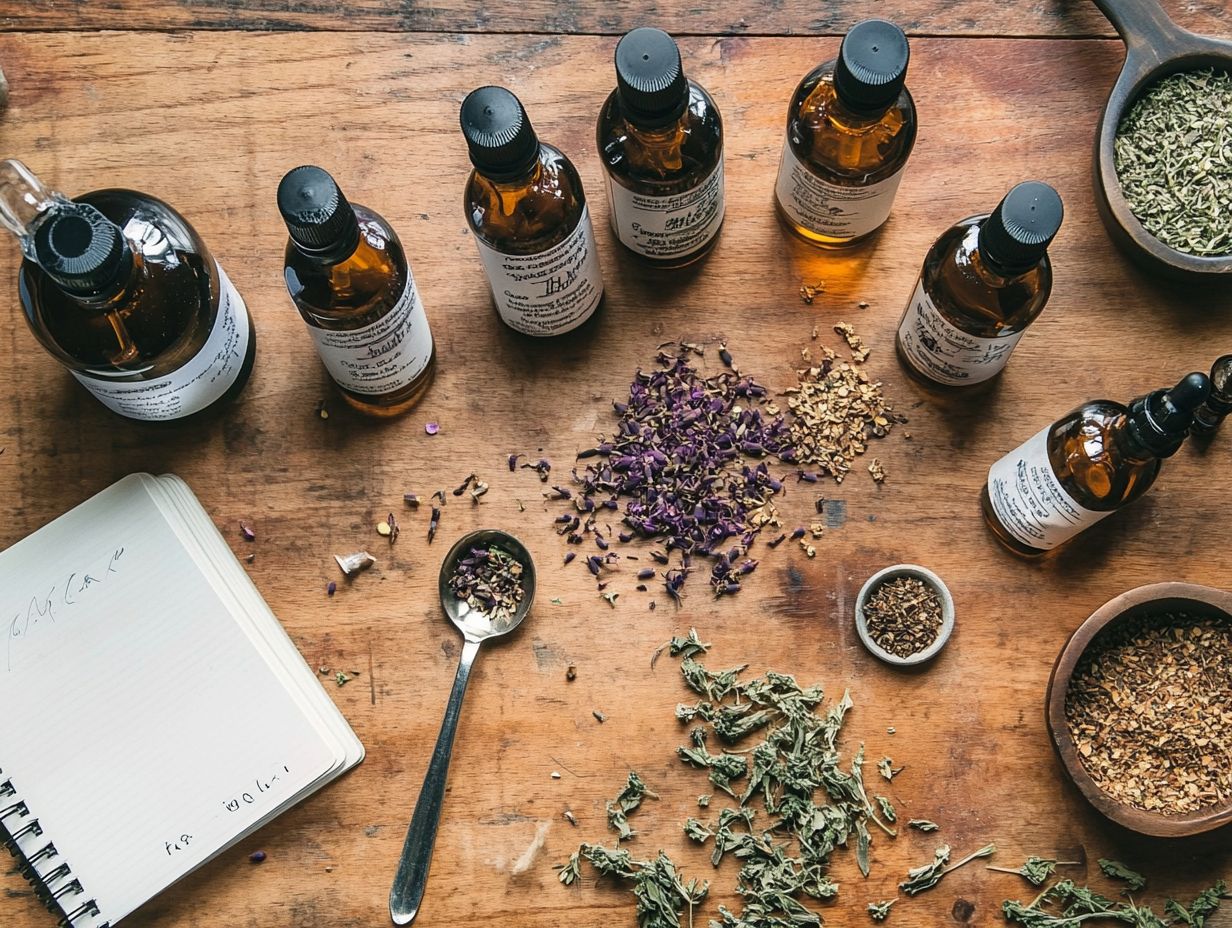
When determining the recommended dosages for herbal formulations, consider factors such as your health status, the specific herbal concentrate you’re using, and its bioactive compounds. Understanding the medicinal properties of the plants involved is crucial.
The extraction method, be it a tincture (a concentrated herbal extract made with alcohol), a decoction, or essential oil, plays a pivotal role. For accurate dosing, it’s important to know how to measure herbal dosages accurately. These methods affect the potency of the active compounds and their resulting effects, impacting the therapeutic benefits of the final product.
For example, a standardized extract of Echinacea or Curcuma longa might suggest a dose of 300 mg to 500 mg, while a fresh tincture could require 1 to 3 ml to achieve similar effects. It’s important to know when to adjust your herbal dosage for optimal results.
Individual responses can vary widely; adjustments may be necessary based on your sensitivity or tolerance levels, especially regarding the active chemicals involved. Whether you’re using herbal supplements for immune support, digestive health, or other therapeutic benefits will influence your dosing approach. For a clearer understanding, refer to the proper dosage for herbal teas to ensure you prioritize both efficacy and safety in your considerations.
Potential Side Effects and Safety Precautions
While you may appreciate the therapeutic benefits of herbal concentrates, be aware of their potential toxicity and the adverse effects that may accompany their use, especially given the potency of certain bioactive compounds.
This highlights the importance of safety precautions when incorporating these herbal formulations into your wellness routine. Individualized methods are key, especially regarding dosage considerations.
Possible Adverse Effects and How to Avoid Them
The possible adverse effects of herbal concentrates can vary significantly, from mild discomfort to more severe issues, depending on the specific herbal remedies and their active ingredients. Consider potential interactions with other medications.
For example, some herbal products might lead to digestive issues, headaches, or allergic reactions. Others could result in more serious complications, such as liver damage or adverse interactions with prescribed medications. This is especially true for individuals with pre-existing health conditions.
When integrating herbal concentrates into your health regimen, prioritizing safety is paramount. This includes carefully reading labels and adhering to recommended dosages. For more insights, refer to understanding herbal dosage and consult with healthcare professionals knowledgeable in herbal medicine for valuable insights. This ensures you make well-informed choices tailored to your unique health needs.
Frequently Asked Questions
Curious about herbal concentrates? Discover their benefits and popularity!
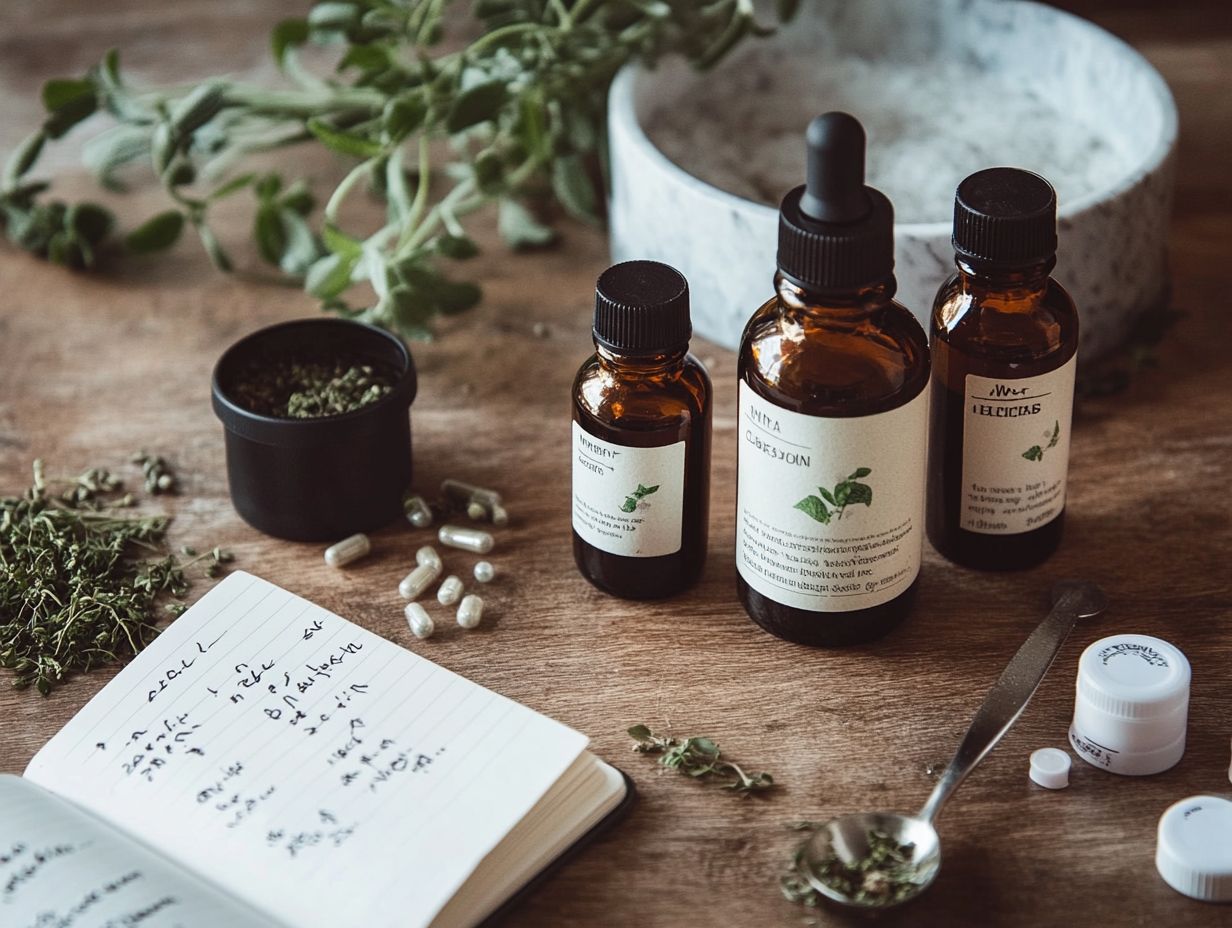
Herbal concentrates are highly concentrated forms of herbal extracts used for medicinal and therapeutic purposes. They are derived from various medicinal herbs and are popular because they offer a more potent and convenient way to consume herbs. Smaller doses are often effective, providing faster results due to the extraction of bioactive compounds.
How should herbal concentrates be dosed to ensure effectiveness and safety?
The dosage of herbal concentrates varies depending on the specific herb, concentration strength, and individual needs. Always follow the recommended dosage instructions provided by the manufacturer or a trusted herbalist. Start with a small dose and gradually increase if needed.
For optimal safety, consider consulting a healthcare professional before use.
Are there any risks associated with consuming herbal concentrates or herbal medicines?
Herbal concentrates are usually safe, but there are risks to consider. Some herbs can interact with medications or pre-existing conditions, so it’s crucial to check with a healthcare professional before trying them.
Some people may experience side effects like stomach upset or allergic reactions. Always monitor how your body responds.
Can herbal concentrates and other medicinal herbs be used for children?
It’s best not to give herbal concentrates to children without consulting a healthcare professional first. Children may need different doses and can be more sensitive to certain herbs.
Always follow recommended dosages for kids and keep a close eye on their reactions.
What is the best way to consume herbal concentrates and herbal tinctures?
You can take herbal concentrates in various ways. Try mixing them into a drink, swallowing directly, or using a dropper under your tongue.
Your choice will depend on what you prefer and the type of concentrate. If the taste is strong, mixing it into a beverage can help.
How long does it take for herbal concentrates and plant extracts to take effect?
The time it takes for herbal concentrates to work varies by individual and herb type. Some might feel results within minutes, while others may take longer.
Be patient and stay alert to how your body feels when trying herbal concentrates for the first time.

